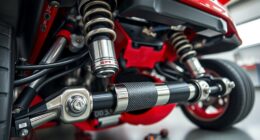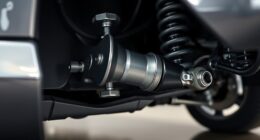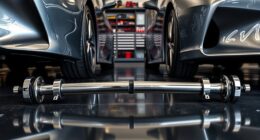Tuning your 2011 Hyundai Elantra can truly elevate its performance. Start by optimizing your ECU, which can boost power by up to 15%. Consider upgrading the intake and exhaust systems for an additional horsepower gain. Don't forget weight reduction; every 100 pounds you shed enhances acceleration. RaceChip tuning offers customizable options, letting you adjust performance to your driving style. This easy installation can transform your Elantra into a sportier, more efficient sedan. With the right modifications, you'll experience a thrilling improvement in handling and power. Keep exploring to discover the best upgrades for your Elantra's transformation.
Key Takeaways
- ECU tuning for the 2011 Hyundai Elantra can enhance horsepower and torque by up to 15%, unlocking its full performance potential.
- Upgrading the exhaust system with a high-performance cat-back can improve power delivery and provide an aggressive sound without sacrificing efficiency.
- Lightweight materials and weight reduction techniques can significantly enhance the Elantra's acceleration and handling by improving the power-to-weight ratio.
- Utilizing a tuning module like RaceChip allows for customizable performance enhancements and real-time adjustments tailored to driving conditions.
- Engaging with the modding community can provide insights and recommendations for reliable aftermarket parts and installation practices.
Performance Modifications Overview
When it comes to tuning your 2011 Hyundai Elantra, performance modifications can make a noticeable difference in how your car drives. One of the most effective strategies is ECU tuning, which allows you to optimize your vehicle's power delivery and enhance its overall performance.
Stock settings are designed for standard components, so adjusting the ECU can reveal hidden potential, especially when paired with intake and exhaust upgrades that can provide an estimated 10 horsepower gain.
In addition to ECU tuning, you should consider weight reduction strategies. By stripping unnecessary components and using lightweight materials, you can greatly improve your Elantra's power-to-weight ratio, leading to better acceleration and handling without breaking the bank.
It's vital to approach these modifications carefully. While some enthusiasts might think about removing catalytic converters, it's generally not recommended as it may hurt engine performance and disrupt your ECU tuning efforts.
After you've made your performance modifications, dyno testing is essential. This step validates your gains and confirms that all upgrades are working in harmony, giving you the most out of your tuned Elantra.
Exhaust System Enhancements

Upgrading the exhaust system on your 2011 Hyundai Elantra is a key step in enhancing performance and achieving that sporty sound you crave. By improving exhaust flow, you can potentially increase horsepower by around 10 hp with the right modifications.
Here are some key points to contemplate:
- Choose the Right Diameter: Opt for a pipe size of less than 2 inches to avoid excessive back pressure and maintain low-end torque.
- Install a High-Performance Cat-Back System: This upgrade not only boosts power but also delivers a more aggressive exhaust note, transforming your driving experience.
- Keep Catalytic Converters Intact: Removing them might hurt your engine performance and tuning options, so ascertain your modifications respect these components.
To validate your performance gains, evaluate dyno testing to measure actual improvements in horsepower and torque output.
With these enhancements, you'll enjoy a more responsive ride and the satisfaction of a well-tuned exhaust system. Embrace the power and sound that comes with these upgrades, and feel the difference on every drive.
Weight Reduction Techniques

Noticeable weight reduction can transform your 2011 Hyundai Elantra's performance, leading to quicker acceleration and improved handling. By stripping unnecessary components, you can enhance overall performance without breaking the bank. Here are some effective weight reduction techniques:
| Technique | Impact on Weight | Considerations |
|---|---|---|
| Remove sound deadening material | Decreases weight considerably | Increases cabin noise |
| Replace parts with lightweight materials | Further reduces weight | Maintain structural integrity |
| Evaluate non-essential parts | Target specific areas for weight loss | Tailor to your needs |
Every 100 pounds you shed can remarkably enhance your performance metrics, such as acceleration and handling. Start by evaluating all non-essential parts in your vehicle. Removing sound deadening materials, while it may increase cabin noise, can yield significant weight savings. Additionally, consider incorporating lightweight materials like carbon fiber or aluminum for replacement parts. These strategies not only help you achieve considerable weight reduction but also guarantee that your Elantra remains structurally sound. By focusing on these techniques, you can create a more dynamic driving experience, amplifying your Hyundai Elantra's potential on the road.
Engine Technology Insights

When tuning your 2011 Hyundai Elantra, understanding the engine code is essential for identifying specific modifications that can enhance performance.
You'll also want to explore fuel efficiency technologies, as they can't only boost power but also help you save on gas.
Let's look at how these aspects can work together to improve your driving experience.
Engine Code Identification
Identifying your Hyundai Elantra's engine code is vital for accessing its tuning potential and performance upgrades. This step not only helps you understand your vehicle's engine technology but also guides you toward the best tuning options available for your specific model.
- Different engine codes mean different modifications.
- CR models typically offer better fuel efficiency than PD models.
- Knowing your engine code can reveal significant performance gains.
Hyundai uses two primary technologies: Common Rail (CR) and Pumpe-Düse (PD). CR models have four-character engine codes, while PD models feature three-character codes. You can locate these codes in your service booklet or on your vehicle's data sticker.
Understanding these codes is important for effective engine code identification, as it informs your choices for performance upgrades.
For instance, if you opt for RaceChip tuning, you could see performance gains of up to 15% in fuel efficiency by optimizing the existing engine capabilities. Knowing whether your Elantra is a CR or PD model will help you choose the right tuning options, ensuring you get the most out of your sedan's performance.
Fuel Efficiency Technologies
Typically, the 2011 Hyundai Elantra stands out for its innovative fuel efficiency technologies that enhance both performance and economy. You'll appreciate the 1.8L inline-4 engine featuring Dual Continuously Variable Valve Timing (D-CVVT), which optimizes valve timing and boosts both fuel efficiency and responsiveness under various conditions.
The Elantra delivers an impressive EPA-estimated fuel economy of up to 40 mpg on the highway, making it one of the top contenders in its class. Its lightweight aluminum construction reduces the vehicle's weight, further promoting fuel efficiency without compromising performance. The standard six-speed automatic transmission guarantees smooth shifting, allowing the engine to perform efficiently across different driving scenarios.
Additionally, the Elantra's aerodynamic design, with a drag coefficient of 0.28, minimizes air resistance, enhancing fuel consumption even more.
| Feature | Benefit | Impact on Fuel Efficiency |
|---|---|---|
| D-CVVT | Optimizes valve timing | Improves fuel efficiency |
| Lightweight construction | Reduces overall weight | Enhances performance |
| Six-speed automatic | Smooth shifting | Maintains engine efficiency |
| Aerodynamic design | Minimizes air resistance | Reduces fuel consumption |
RaceChip Tuning Benefits

RaceChip tuning offers several compelling benefits for your 2011 Hyundai Elantra, transforming your driving experience with enhanced performance and efficiency. By installing a RaceChip module, you can greatly boost your car's power, torque, and acceleration without compromising safety.
This upgrade not only makes your sedan more fun to drive, but it also optimizes engine capabilities.
- Experience up to a 15% increase in fuel efficiency (MPG), making daily driving more cost-effective.
- Enjoy customizable tuning options with multiple fine-tuning mappings tailored to your driving style and conditions.
- Utilize the RaceChip app for real-time adjustments and automatic software updates, guaranteeing long-lasting performance enhancements.
With RaceChip, you're not just enhancing performance; you're also improving fuel efficiency, making it a smart choice for any Elantra owner.
The easy Plug&Drive installation means you'll notice immediate improvements, putting the power back in your hands.
Whether you're commuting or heading out for a weekend drive, RaceChip tuning guarantees your Elantra delivers the performance and efficiency you crave.
Embrace the upgrade and feel the difference on the road!
Installation Process Explained

Upgrading your 2011 Hyundai Elantra with tuning modifications can be a straightforward process, thanks to the Plug&Drive principle. This design allows you to complete the setup in just minutes, requiring minimal tools. When you receive your tuning module, you'll find detailed installation instructions included. These step-by-step guidelines guarantee that you achieve peak performance enhancement without any guesswork.
Start by preparing your workspace and gathering the necessary tools. Follow the provided instructions closely, taking care to connect all components accurately. For added durability, consider using professional installation techniques, such as double-sided tape and polyurethane glue. This will enhance the effectiveness of your modifications.
If you encounter any issues during installation, don't hesitate to reach out for technical support. Whether you have questions about specific steps or need clarification on the tuning process, knowledgeable support staff are ready to assist you.
Once you've finished the installation, you'll immediately notice the performance enhancements, with improved power and responsiveness that will elevate your driving experience. Enjoy the transformation as you take your Elantra to the next level!
Smart Control Features

Smart control features for your 2011 Hyundai Elantra can greatly enhance your driving experience. With the RaceChip app, you've got the power to customize your vehicle's performance right from your smartphone.
Here are some standout features:
- Tuning Stages: Switch between Efficiency, Sport, and Race modes to match your driving style.
- Real-Time Fine-Tuning: Get expert support to optimize performance based on your preferences.
- Adjustable Throttle Response: Use the XLR Throttle Tuning feature to tailor your throttle response for a more engaging drive.
These smart control features guarantee you have complete control over your tuning enhancements. You can easily adjust settings on-the-fly, making every drive feel unique.
Automatic software updates keep your tuning modules current, adapting to any changes in vehicle dynamics. Plus, if you ever want to revert to the original settings, the stock tune reset option makes it a breeze.
With these features at your fingertips, you can maximize the performance of your Elantra, making it not just a sedan, but a personalized driving machine.
Embrace the future of driving with smart control!
Community Perspectives on Tuning

When you start tuning your 2011 Elantra, sharing your experiences can help others in the modding community make informed decisions.
You'll find that insights from fellow enthusiasts highlight the balance between performance and reliability.
It's vital to take into account both the potential gains and the risks involved in any modifications you choose.
Tuning Experience Sharing
In the vibrant community of Hyundai Elantra enthusiasts, sharing tuning experiences plays an essential role in refining one's approach to performance modifications. By exchanging insights, you can greatly enhance your tuning journey and make informed decisions about your vehicle. Members often provide valuable feedback on various setups, from suspension tweaks to engine upgrades, allowing others to avoid common pitfalls and maximize their car’s potential. Whether you’re exploring Hyundai Elantra mods or curious about Hyundai Sonata 2006 tuning options, these discussions open the door to a wealth of knowledge. Ultimately, the community fosters a collaborative environment where enthusiasts can experiment and fine-tune their vehicles with confidence.
Here are some key takeaways that community members often discuss:
- The importance of selecting reputable aftermarket parts for peak performance without sacrificing reliability.
- The benefits of ECU tuning, with many reporting power gains of up to 15% after using modules like RaceChip.
- Strategies for weight reduction that can lead to remarkable performance enhancements.
Community forums have become a haven for both novice and seasoned tuners, where you can learn from each other's successes and challenges.
You'll find that driver skill, combined with proper tuning and modifications, is fundamental to revealing your Elantra's full potential.
By diving into these tuning experiences, you'll not only gain practical knowledge but also foster connections with fellow enthusiasts who share your passion for performance upgrades.
Modding Community Insights
Frequently, members of the Hyundai Elantra modding community share diverse perspectives on tuning, creating a rich tapestry of insights that can guide your performance upgrades. One common theme is the significance of performance tuning, especially through ECU reprogramming. Many enthusiasts advocate this method to access additional horsepower and torque, enhancing your driving experience.
Upgrading your exhaust system and intake components is another favored modification. This combination can yield an approximate 10 horsepower gain, especially when paired with performance tuning. However, discussions often stress the importance of maintaining your vehicle's catalytic converters to optimize ECU performance and prevent power loss.
In the modding community, younger enthusiasts tend to push the envelope with aftermarket modifications, while older members usually lean toward traditional performance upgrades that prioritize reliability.
Regardless of your approach, community feedback consistently emphasizes the need for thorough research and professional installation. This caution helps guarantee you achieve your desired performance gains while minimizing potential risks associated with tuning modifications.
Trends in Automotive Modifications

Automotive enthusiasts often embrace a variety of trends in modifications to enhance their vehicles' performance and personal style.
Today, you'll find several popular directions shaping the aftermarket industry, reflecting both innovation and practicality.
- Performance Modifications: ECU tuning, intake, and exhaust upgrades are vital for boosting horsepower, with many reporting gains of around 10 HP from basic tweaks.
- Forced Induction: Turbocharging is gaining traction as it offers a significant power boost over naturally aspirated engines, appealing to a diverse range of drivers.
- Weight Reduction: By removing non-essential components and using lightweight materials, you can enhance performance without breaking the bank.
Community engagement plays an important role in these trends.
Enthusiasts regularly share their experiences and recommendations, influencing the popularity of specific upgrades and tuning methods.
The growth of specialized tuning modules like RaceChip exemplifies this trend, offering optimized engine performance and smartphone app control for real-time adjustments.
As you navigate the automotive modification landscape, staying connected with fellow enthusiasts can provide invaluable insights and inspiration for your Hyundai Elantra 2011 tuning journey.
Frequently Asked Questions
Can Hyundai Elantra Be Tuned?
Yes, you can tune your Hyundai Elantra. Aftermarket modules and ECU remapping enhance performance, but keep in mind that modifications may void your warranty. Research thoroughly and consider professional installation for the best results.
How Much Does It Cost to Get a Tune-Up on a Hyundai Elantra?
A tune-up for your Hyundai Elantra usually costs between $300 and $500. Routine maintenance like spark plug replacements is essential for peak performance, so it's wise to schedule regular check-ups to keep your car running smoothly.
Can You Tune a Hyundai?
Absolutely, you can tune a Hyundai. For example, if you opt for a RaceChip module, you'll boost your Elantra's power and fuel efficiency, making your drives more thrilling while enhancing overall performance. Just proceed cautiously!
Why Is My Hyundai Elantra Losing Power?
If your Hyundai Elantra's losing power, check the air filter, fuel system, and spark plugs. Issues with the throttle body or engine codes could also indicate problems; diagnosing these can help restore performance effectively.
Conclusion
As you commence on the journey of tuning your 2011 Hyundai Elantra, the possibilities unfold before you. With the right modifications, you can reveal hidden power and transform your sedan into a thrilling ride. Just imagine the roar of a custom exhaust or the thrill of a perfectly tuned engine. But, will you take the plunge and join the ranks of enthusiasts who've embraced this exhilarating journey? The choice is yours, and the road ahead is full of potential.










